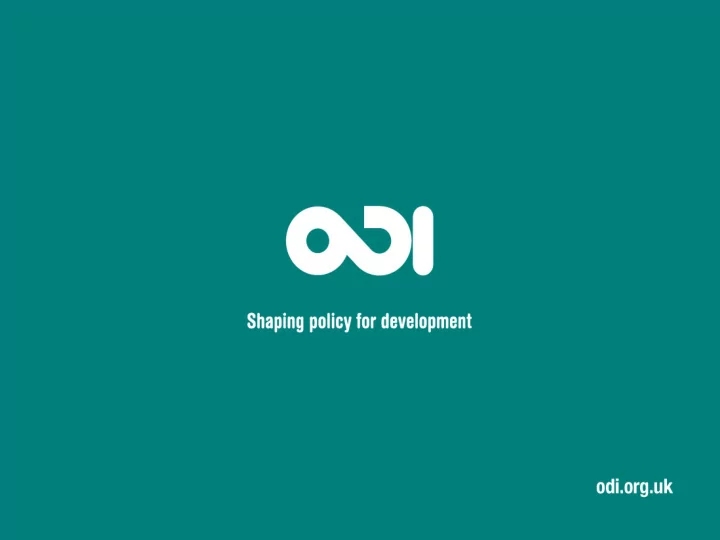

The key role of development cooperation in making the world a safer place Romilly Greenhill Team Leader Development Finance 7 th April 2016
What role for development cooperation? 3 #hashtag
So where should development cooperation be spent? • Focus on countries and regions in which – Need is greatest, particularly to LNOB – Ability to mobilise other resources is lowest 4
Where is need greatest? 5
6 Available public finance and social compact costs (LICs) $ per annum per person 200 300 100 0 Somalia Malawi Burundi Central African Republic Ability to mobilise domestic resources Congo DRC Liberia Niger Madagascar Guinea Ethiopia Eritrea Gambia Uganda Guinea-Bissau Togo North Korea Mozambique Rwanda Tanzania Burkina Faso Mali Sierra Leone Afghanistan Nepal Benin Haiti Zimbabwe Bangladesh Kenya Cambodia Tajikistan Chad Myanmar Mauritania Aid available (50%) Revenue capacity available (50%) Social compact cost @ODIdev #FtF2015
New challenges can take resources away from this group of countries • Climate change: 61% of $30bn Fast Start Financing to mitigation • Refugee spending putting pressure on aid • Security focus can skew aid allocation, including within the fragile states group • 16% drop in aid to LDCs in 2014 7
We also need to spend development cooperation better • Not just ‘business as usual’, but a new consensus – Ownership, alignment and speed – More ‘politically smart’ approaches to aid delivery – Better risk management – Longer-term approaches – Less long-term reliance on short-term humanitarian channels • These requirements pose challenges for current ‘results agenda’ and aid scepticism 8
A new multilateralism • Strong case for using multilaterals, especially in fragile states – Capacity to take on and spread risks – Longer-term perspective and longer-term results – Less politicised – More selective – More predictable • But multilaterals need to be reformed 9
Conclusions • A new agenda, and new challenges – but should not lose focus on the core purpose of ODA • Real tensions between new agendas and ODA allocation • Keeping the focus on LDCs and fragile states does not mean ‘business as usual’ • Need a new ‘politically smart’ consensus on development effectiveness • A new multilateralism 10
ODI is the UK’s leading independent think tank on international development and humanitarian issues. We aim to inspire and inform policy and practice to reduce poverty by locking together high-quality applied research and practical policy advice. The views presented here are those of the speaker, and do not necessarily represent the views of ODI or our partners. Overseas Development Institute 203 Blackfriars Road, London, SE1 8NJ T: +44 207 9220 300 www.odi.org.uk r.greenhill@odi.org.uk
Recommend
More recommend